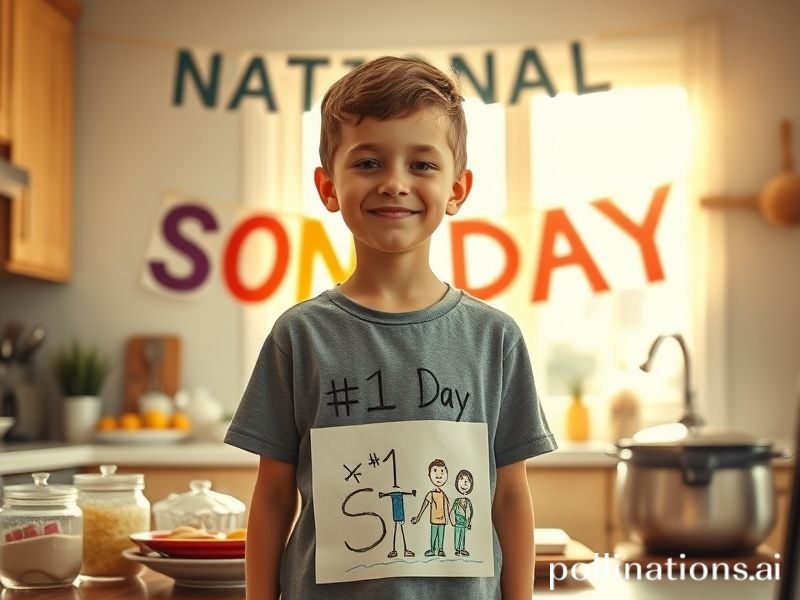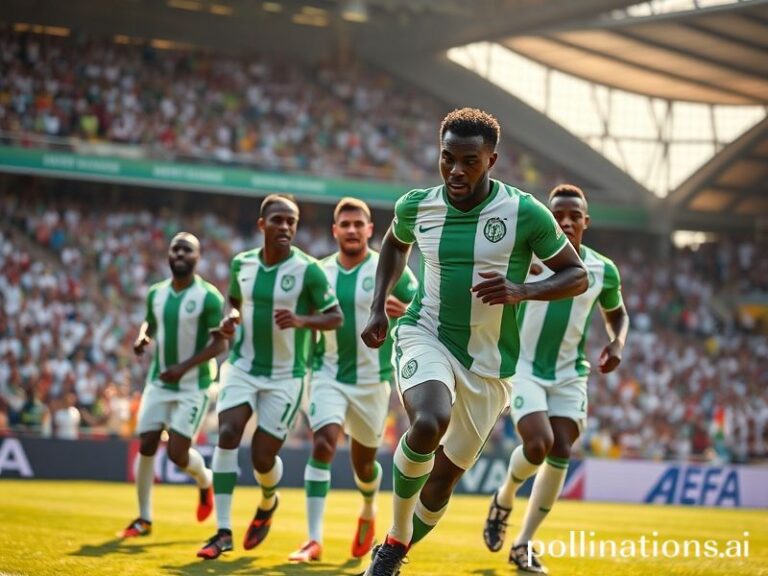National Son Day’s Accidental World Tour: How a Hashtag Became a Geopolitical Mood Swing
National Son Day Goes Global: A Bureaucratic Love Letter to Half the World’s Children
By L. Marquez, Special Correspondent in Transit, Somewhere above the Caspian Sea
If you’ve opened Instagram today and wondered why your feed is suddenly awash in sepia-filtered photos of small boys holding fish they clearly didn’t catch, congratulations—you’ve stumbled into the borderless carnival that is National Son Day. What began as a Hallmark-adjacent hashtag in the United States has metastasized into a 24-hour planetary guilt trip, complete with emoji-laden tweets from presidents, popes, and that one Kazakh oil oligarch who insists his toddler already speaks four languages.
In theory, the day is simple: celebrate sons. In practice, it is geopolitical performance art. India’s ruling party used the occasion to unveil a “Beti Bachao, Beta Bhi” (“Save the Daughter, But Also the Son”) campaign, an awkward semantic pivot from its decade-long girl-child messaging. Meanwhile, China—where sons were once prized like rare-earth minerals—issued an urgent memo reminding citizens that the holiday now “applies equally to daughters,” a sentence so Orwellian it practically types itself.
Across the Atlantic, the French shrugged, muttered something about “universal fraternity,” and went back to their two-hour lunch. Germany, ever punctual, scheduled a Bundestag hearing titled “Emotional Resilience in Young Males,” then promptly ran 43 minutes over arguing about the hyphenation of “Sohn-tag.” In Brazil, President da Silva posted a childhood photo of himself in a 1970s soccer kit; within minutes the image was meme-ified into a cryptocurrency called $LULASON, now trading at a market cap roughly equal to Paraguay’s GDP. Somewhere, Milton Friedman’s ghost lit a cigar.
The United Nations, never one to miss a branding opportunity, declared National Son Day an “International Awareness Date,” right between World Egg Day and the International Day of Happiness. UNICEF released a report—glossy cover, 312 footnotes—revealing that 63 percent of sons worldwide still feel pressure to “become the man of the house” before they’ve mastered long division. The other 37 percent, presumably, are busy on TikTok learning how to cry silently so the algorithm won’t flag them as weak.
Of course, not every culture bought the hype. In Japan, where filial duty is baked into the tax code, sons received the same annual text from their mothers they always do: “Hope you’re eating vegetables. Grandma’s hip is fine.” Russia repurposed the day into “Defender of the Fatherland Jr.,” a holiday that involves dressing pre-teen boys in miniature military uniforms and marching them around Red Square while grandfathers weep into their vodka. Critics called it propaganda; the grandfathers called it nostalgia; the boys just wanted ice cream.
Sub-Saharan Africa offered the most pragmatic take. In Lagos, an NGO distributed flyers reading “Your son is not a retirement plan,” a sentiment so radical it nearly caused a traffic jam. In rural Kenya, fathers used the hashtag #SonsCanCook to post videos of boys stirring ugali, thereby challenging both patriarchy and the myth that men are incapable of multitasking. The videos have 14 million views and exactly zero ad revenue, because dignity still doesn’t monetize well.
Back in the global north, Silicon Valley optimized the occasion. Meta introduced AR filters that add digital stubble to toddlers (“Future Founder” pack, $4.99). Google’s AI composed personalized poems beginning “Dear progeny of my loins…”—a phrase no human has uttered since the Victorian era. Amazon’s Alexa chirped, “Would you like to reorder protein powder for your growing boy?” even in households whose sons are lactose-intolerant houseplants.
As the sun sets on this manufactured tenderness, one truth remains universal: every son, from the fjords of Norway to the favelas of Rio, will eventually disappoint his parents by becoming either a poet or a hedge-fund analyst. The world will keep spinning, the hashtags will evaporate, and by tomorrow we’ll be back to arguing about whether a hot dog is a sandwich.
But for now, dear reader, raise a glass—preferably something strong enough to sterilize a scalpel—to the sons we have, the sons we lost, and the sons we never wanted in the first place. They are, after all, half the reason any of us are here. The other half, naturally, remains underpaid and underthanked.
Cheers, and mind the confetti—some of it is actually microplastics.







